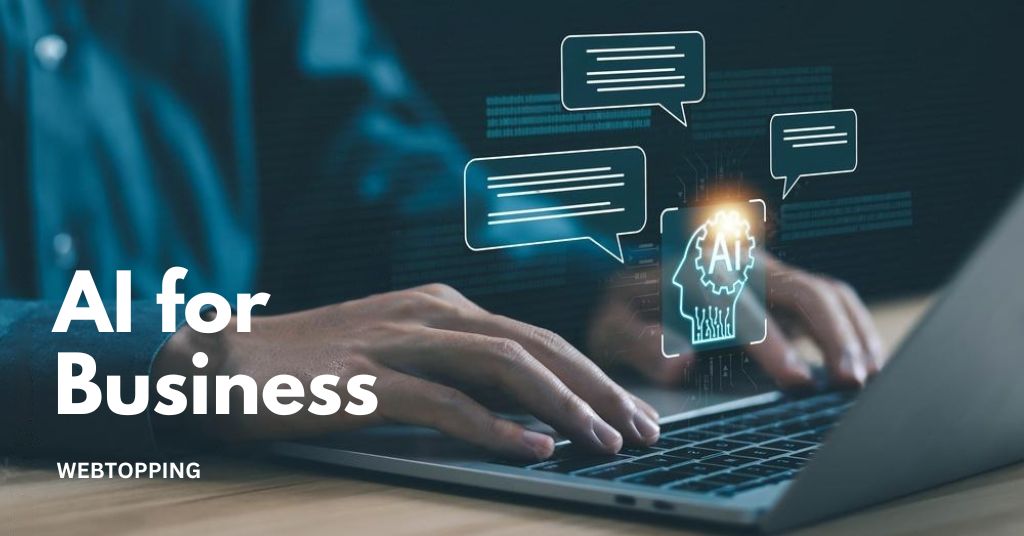
Ever wondered how top-performing companies keep their teams focused on high-value work while routine tasks are handled effortlessly? Imagine your marketing team diving straight into creative work, freed from hours of data crunching. Your customer support becomes a powerhouse, handling hundreds of queries daily with AI-powered chatbots that never tire. Meanwhile, your sales team targets the right leads with laser precision, driven by insights from AI algorithms.
This is the power of integrating Artificial Intelligence (AI) into your business operations. AI isn’t just about cutting-edge technology; it’s about transforming how teams work, collaborate, and make decisions.
As more organizations explore the potential of AI for business, it’s crucial to understand what to expect when integrating AI into business operations. Let’s explore more about the benefits, challenges, and best practices for adopting AI in business, providing you with actionable insights and a clear roadmap for successful integration.
What Does AI for Business Mean?
Artificial Intelligence (AI) is not just a buzzword; it is a powerful technology revolutionizing various industries. When we talk about AI for business, we refer to the use of AI tools and technologies to enhance business processes, decision-making, and overall efficiency. From automating routine tasks to providing data-driven insights, AI can be a game-changer for companies looking to gain a competitive edge.
There are several types of AI in business, including Machine Learning (ML), Natural Language Processing (NLP), Computer Vision, and Generative AI, each serving different purposes. For businesses, AI can automate tasks, predict market trends, optimize supply chains, enhance customer service, and more.
Key Benefits of Integrating AI into Business Operations
When considering the integration of artificial intelligence in business, understanding the benefits is vital. Here are some of the primary advantages that AI brings to business operations:
1. Improved Decision-Making
AI-powered analytics can process vast amounts of data much faster than humans. By using AI tools for business, companies can gain insights from data in real time, enabling them to make faster and more informed decisions. AI can identify patterns, predict trends, and provide recommendations that drive business growth.
2. Increased Efficiency and Automation
One of the main advantages of AI is automation. AI frees up staff members’ time to concentrate on more strategic and innovative work by automating repetitive activities. AI, for instance, may automate inventory management, chatbot customer support, data entry, and more. Time is saved, and human error is decreased, too.
3. Enhanced Customer Experience
AI can analyze customer behavior and preferences, enabling businesses to offer personalized experiences. From AI-powered chatbots providing instant customer support to recommendation engines suggesting products based on previous purchases, business AI tools are enhancing how companies interact with their customers.
4. Cost Reduction
Implementing AI in business can lead to significant cost savings. Automation reduces labor costs and operational inefficiencies. Additionally, predictive analytics can help in inventory management and reducing wastage, further saving costs.
5. Better Risk Management
Compared to conventional approaches, AI can identify possible threats more quickly and precisely. For example, AI models can anticipate manufacturing machinery failures or identify fraudulent activity in banking transactions, allowing for proactive risk management.
What Are The Major Challenges in Implementing AI in Business?
While the benefits are compelling, integrating AI for business also comes with challenges. Here are some of the common obstacles that businesses face:
1. High Initial Costs: Implementing AI requires significant investment in technology, infrastructure, and talent. For many businesses, especially small and medium-sized enterprises, the cost can be a major hurdle.
2. Data Privacy and Security: Since AI uses a lot of data, data security and privacy are issues that are raised. Businesses need to make sure that their AI systems are safe from cyberattacks and abide by laws like the GDPR.
3. Lack of Expertise: When it comes to AI, many firms struggle with a lack of internal competence. It might be difficult to find and keep qualified experts who can oversee AI initiatives, which can slow down the integration process.
4. Integration with Existing Systems: Integrating AI with legacy systems can be complex. Compatibility issues may arise, and businesses may need to overhaul their existing infrastructure, which can be both time-consuming and costly.
5. Ethical and Bias Concerns: When it comes to AI, many firms struggle with a lack of internal competence. It might be difficult to find and keep qualified experts who can oversee AI initiatives, which can slow down the integration process.
Best Practices for Integrating AI in Business Operations

To successfully integrate artificial intelligence into business, organizations should follow these best practices:
1. Start with a Clear Strategy
Before diving into AI implementation, businesses need a well-defined strategy that aligns with their overall goals. Identify specific areas where AI can add the most value—such as automating customer service, optimizing supply chains, or enhancing data analytics. For instance, using a tool like IBM Watson can help businesses automate customer interactions and gain insights from unstructured data. Once you see positive results from these pilots, you can scale up gradually, learning and adapting as you go.
2. Invest in Training and Development
Developing a workforce prepared for AI is crucial for integration to be effective. Invest in the upskilling of your current staff by providing them with workshops and training in AI, with an emphasis on topics like data analysis, product management, and strategic application.
Encourage team members to become familiar with AI tools that support business operations, like Hootsuite Insights for AI-driven social media management or Tableau for AI-powered data visualization. Providing continuous learning opportunities ensures that your team stays current with the latest AI trends and can effectively implement and manage AI solutions to drive business growth.
3. Ensure Data Quality and Management
For AI algorithms to produce results that are precise and significant, they require high-quality data. To prevent bias or inaccuracies in AI-driven insights, make sure your data is accurate, current, and relevant. Put in place reliable data management procedures, such as frequent data audits and data governance frameworks.
4. Collaborate with AI Experts and Vendors
Navigating the complexities of AI integration can be challenging without the right expertise. Collaborating with AI solution providers, such as Microsoft Azure AI, and Google Cloud AI, or consulting firms like Accenture AI, can help businesses implement AI successfully. These vendors provide valuable insights, support, and customized solutions tailored to your business needs, whether it’s developing a custom AI model or integrating off-the-shelf solutions.
5. Focus on Scalability
When selecting AI solutions, always consider scalability. The AI tools you choose should be flexible and capable of growing your business as it evolves. For example, cloud-based AI platforms like Amazon Web Services (AWS) AI and Google Cloud AI offer scalable solutions that can be adjusted based on business requirements.
AI for Small Business: How to Get Started
For small businesses, the idea of adopting AI can seem daunting. However, AI for small businesses is more accessible than ever, thanks to advancements in technology and more affordable AI solutions. Here are some tips for getting started:
- Start Small: Start small with AI projects that can pay off quickly, such as marketing tools powered by AI or chatbots for customer care.
- Leverage Cloud-Based AI Solutions: Cloud-based AI platforms offer flexibility and affordability, allowing small businesses to access powerful AI tools without large upfront investments.
- Focus on ROI: Evaluate the return on investment for each AI project. Choose AI applications that can deliver measurable benefits to your business.
- Educate Yourself and Your Team: Understanding AI’s potential and limitations is crucial. Attend webinars, workshops, and training sessions to stay informed.
What Are The Key Technologies for Large-Scale AI Implementation?
To successfully implement large-scale generative AI for business, several technologies must be in place:
- Cloud Computing Platforms: Necessary for storing and processing large datasets.
- Data Lakes and Warehouses: To organize and manage vast amounts of data.
- Advanced Machine Learning Frameworks: Such as TensorFlow, PyTorch, or Keras, to develop AI models.
- API Integrations: For seamless integration with existing business systems.
- Cybersecurity Measures: To protect sensitive data and ensure compliance with regulations.
Final Word: Preparing Your Business for an AI-Driven Future
Integrating AI for business can unlock tremendous potential, from increasing efficiency to enhancing customer experience. However, businesses must be prepared for the challenges and take a strategic approach to ensure successful integration. By understanding what to expect and following best practices, companies can harness the power of artificial intelligence in business to drive growth and innovation. By staying informed and investing wisely, any business, big or small, can successfully integrate AI into its operations and achieve sustainable success in the era of digital transformation. Stay tuned to WebTopping for more in-depth articles, insights, and strategies on leveraging technology and innovation for business growth. Empower your business with the knowledge and tools to thrive in today’s competitive landscape.
Frequently Asked Questions
To use large-scale generative AI, businesses need robust cloud infrastructure, advanced machine learning frameworks, extensive data management systems, and strong cybersecurity measures.
Businesses can use AI for various purposes, such as automating tasks, enhancing customer experience, analyzing data for better decision-making, and optimizing supply chain management.
AI can improve efficiency, reduce costs, provide valuable insights through data analytics, automate repetitive tasks, and offer personalized customer experiences.
In business, AI stands for Artificial Intelligence, a technology that enables machines to mimic human intelligence and perform tasks like decision-making, language translation, and predictive analytics.
The newest and least common type of AI in business is Generative AI, which involves AI models that can create new content, such as text, images, or even software code.
Small businesses can use AI by adopting cloud-based solutions, automating marketing and customer service tasks, and leveraging AI analytics tools for better decision-making.
To use AI in your business, start by identifying areas where AI can add value, choosing the right AI tools or platforms, ensuring data quality, and training your team on AI technologies.





